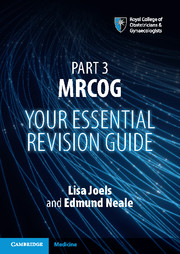Book contents
- Frontmatter
- Contents
- Foreword
- 1 The Part 3 Clinical Assessment in the Context of the MRCOG Examination
- 2 Core Clinical Skills
- 3 The Modules of the Curriculum Assessed in the Part 3 Exam
- 4 Tips for Candidates
- 5 Practice Tasks with Videos
- 6 Revision Resources
- Appendix 1 Part 3 MRCOG Clinical Skills Assessment Template
- Index
6 - Revision Resources
Published online by Cambridge University Press: 05 September 2016
- Frontmatter
- Contents
- Foreword
- 1 The Part 3 Clinical Assessment in the Context of the MRCOG Examination
- 2 Core Clinical Skills
- 3 The Modules of the Curriculum Assessed in the Part 3 Exam
- 4 Tips for Candidates
- 5 Practice Tasks with Videos
- 6 Revision Resources
- Appendix 1 Part 3 MRCOG Clinical Skills Assessment Template
- Index
Summary
The practice of obstetrics and gynaecology is a huge subject which is constantly changing as applied clinical science informs our everyday practice. While this is an essential part of the application of evidence to routine practice, it can be daunting for the MRCOG candidate who just wants a firm curriculum from which to revise and which represents the sum total of knowledge to be tested in the examination. The reality is that the evidence base for clinical medicine is constantly evolving and, as reflective practitioners, we should all be keeping up to date with developing science.
The ‘gestation period’ for an exam question is 9–12 months, and while there is a clear need to cover all 14 modules tested in the Part 3 exam, it is natural for the exam committee to focus any questions on recent developments. Each question or task will be extensively reviewed and refined in exam committee meetings before being accepted as an appropriate question for the examination.
Hopefully the preceding chapters will have shown that trying to spot hot topics and only revising parts of the curriculum will put a candidate at high risk of failure. However, it is also true that new guidelines and developments will provide a fertile ground for writing new exam questions.
So, how should you approach exam revision?
Breadth Versus Depth
In order to pass the Part 2 written exam you need both breadth and depth for each module. The clinical skills are clearly defined in the curriculum. It is tempting to view the Part 3 exam as being purely about communication, but hopefully the practice resources contained in this book will have shown you that without sound clinical knowledge you won't be able to pass the exam. The starting point for revision is the core curriculum on the RCOG website.
In order to start working through each module in more depth, you should consider using the e-learning resources in StratOG. There are resources covering core modules of the curriculum which are available free to trainees registered with the RCOG or for other doctors for a small fee. There are some topics which require in-depth understanding and for which detail is essential.
- Type
- Chapter
- Information
- Part 3 MRCOGYour Essential Revision Guide, pp. 152 - 155Publisher: Cambridge University PressPrint publication year: 2016

